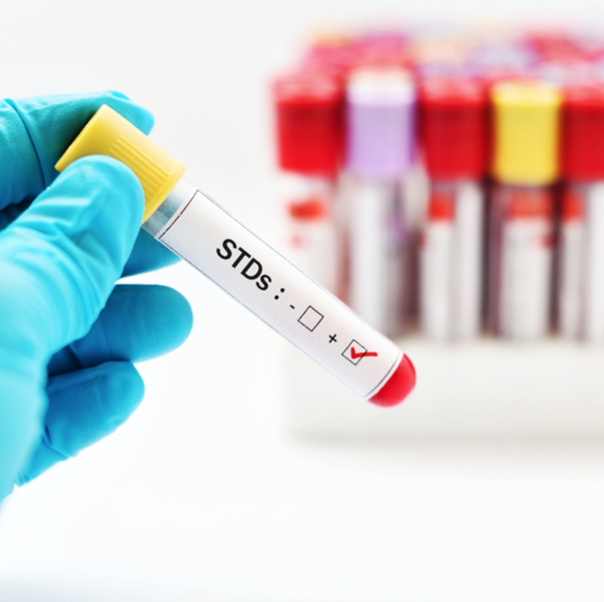- Fast results
- 4,000+ locations
- 4.8 star rating
Need Help? (888) GET LABS

This article is Medically Approved ✓ by Dr. Edward Salko

When it comes to STD tests, the right one can lead you in restoring your sexual health.
But first, it is important that you don’t panic.
Unlike decades ago, STD (Sexually Transmitted Disease) or STI (sexually transmitted infection) testing nowadays are more efficient and reliable.
Confidentiality is even strengthened by the fact that you can perform the test at the lab.
But how do you know if you’re targeting the proper STD test?
Furthermore, how do you know if you need to undergo a test immediately?
If you are sexually active or may have noticed some symptoms of STD, it is normal to feel anxious.
But asking key questions is an excellent step to lead you closer to restoring your health.
Now on to the answers.

STD testing is required to avail of the right treatment plan.
Some STDs can lead to severe medical conditions such as pelvic inflammatory disease and infertility. It can also become fatal if left untreated.
There are also STDs that can develop without any symptoms. If not immediately diagnosed, you could be a longtime carrier of the infection and jeopardize the health of your sexual partner.
Nonetheless, before getting tested for STD, it is crucial to know how these infections can disrupt a person’s health.
Here’s a short guide to medical conditions caused by the most common STDs in the US:
1. HPV (human papillomavirus) – genital warts, cervical cancer
2. Chlamydia – infertility, pelvic inflammatory disease, higher risk for ectopic pregnancy
3. Gonorrhea – pregnancy complication, pelvic inflammatory disease, infertility
4. Trichomoniasis – high risk for prostate cancer, HIV infection, and cervical cancer; newborn infection can lead to low IQ or low birth rate
5. Genital Herpes – increased risks of contracting other STDs, meningitis, rectal inflammation, swelling of the ureter; and newborn infection can lead to brain damage, blindness, and death;
6. Syphilis – paralysis, brain damage, dementia, blindness, impairment of critical organs (liver, heart, bones, and nerves); stillborn or developmentally challenged children
7. HIV (human immunodeficiency virus) – AIDS, cardiovascular disease, lung disease, HIV-Associated Neurocognitive Disorders (HAND), hepatitis B and C, and other liver complications
It is important to note that these conditions often develop if the corresponding STD is untreated or mismanaged.
Apart from HIV, HPV, and genital herpes, STDs are generally curable.
Those that are caused by bacterial infection are prescribed antibiotics designed for specific pathogens.
Others that are yet to be cured are controlled by medications to lessen their symptoms.
As most of these STDs are treatable, it is imperative to take the first step towards getting tested.
When it comes to diagnosis, the only way to confirm the disease is through laboratory tests or test kits subsequently analyzed in an authorized facility.
With the subject of how often you should get tested for STD, it largely depends on the nature of the infection, sexual activity, and lifestyle that increases your susceptibility for the disease.
As a rule of thumb, you should be tested for STD at least once a year. If you are sexually active with multiple partners or engages in unprotected sex, testing should be more frequent.
When it comes to HIV testing, at least once in your lifetime is the bare minimum.
However, according to CDC, those who are at high risks such as sexually active transgender, gay, and bisexual men should consider getting tested every 3 or 6 months.
On the other hand, pregnant women are advised to get tested for STDs early on in the pregnancy.
Undiagnosed STDs like HIV, hepatitis B and C, chlamydia, syphilis, and gonorrhoea can cause medical problems for both the mother and the fetus.
Without the proper treatment, a pregnant woman may experience preterm labor, aggravated infection, and complications during vaginal delivery.
Likewise, the unborn baby could suffer from organ failure, blindness, deafness, brain damage, low birth weight, premature birth and even death.

STD tests are generally regarded as accurate. They usually have a 97% to 99% sensitivity and specificity rate.
Most of the available tests, especially those from trusted laboratories and companies, are thoroughly tested before market release. They also met the standard for laboratory testing and are approved by the Food and Drug Administration.
However, there are instances where the STD test could fail, especially if the following scenarios occurred:
1. The instructions were not strictly followed.
2. The collection method was not performed as directed.
3. Specimens were not submitted on time to the partner laboratory for analysis.
While many people nowadays have become more confident with readily available STD test kits, others still prefer traditional in-office tests. With the latter, you can immediately discuss treatment options when you get a positive result in your STD test.
Nonetheless, the availability of these kits addressed one of the most critical issues of STD diagnosis. And that is confidentiality.
Years ago, people were hesitant to go to the doctor for STD-related symptoms. The stigma of STDs led to the fear of judgment.
Thereby, people would choose to hide their conditions instead of getting a precise diagnosis in exchange just to keep their sexual history private.
However, this was changed when STD tests can be ordered online and perform privately.
More options were also made available. You can opt to get tested for a single STD or STI or get the complete panel.
It is crucial to schedule an STD test at least once a year.
But in some cases, an STD test is required frequently or immediately, especially for sexually active individuals or those who have not used protection during sex.
Here are some instances where you might have to order an STD test as soon as possible.
For those who have just found out about their infection, the ethical action is communicating with their sexual partner or partners and informing them of the condition. This is done to ensure that the spread of the STD is stopped.
If you receive this kind of information, you must take the STD test at once.
It doesn’t matter if you have the symptoms or not since some STDs can be asymptomatic. You may have a robust immune response to the infection, but you can still be a carrier.
If left untreated, the STD will continue to be transmitted to your partner.
If you are sexually active and have noticed something unusual which could be suggestive of an STD, the best thing to do next and get tested.
Even without knowing whether your partner has an STD or not, it is vital that you get the correct diagnosis.
The following are common symptoms of STDs you can use as a reference:
Choosing an STD test mostly depends on your purpose.
If it is for routine purposes or as part of your annual checkup, you can have the bundle STD tests such as Personalabs’ Comprehensive STD Blood Test or the 11 Panel STD Blood Test.
These panels contain tests for common STDs. Having them all in one product will save you from the hassle of ordering STD tests one by one.
You can also order these tests if you suspect STD but you’re not sure which one you’ve contracted.
On the other hand, if you intend to test for a specific infection, you can simply order that particular STD test.
If you don’t know where to find these STD tests, you can always check Personalab’s Sexual Health Blood Tests to find the one you need.
Testing for STD can be a stressful experience, let alone getting a positive result. But if you fix your thoughts to the treatment plan instead of the condition, it could help ease up the burden.
On top of that, STD tests provide convenience and accuracy of testing.
Don’t hesitate to get tested to keep your sexual health optimal.

© Copyright 2025 Personalabs. All Rights Reserved.